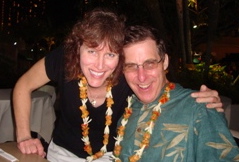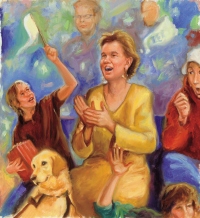Married to someone who’s blind
July 9, 2010 • 31 Comments • Posted in blindness, careers/jobs for people who are blind, Mike Knezovich, Uncategorized, writingMike is having out-patient surgery this Wednesday. We’ll walk to the hospital together, I’ll stay during the surgery, and once the staff says Mike’s fine to go I’ll walk outside with him and we’ll catch a cab home. That was the plan, at least. But then Mike’s “Patient Information after Surgery” sheet came in the mail, and it said:
- You Must have a responsible party available to take you home.
So now, in addition to the anxiety any average person might have before going through surgery, Mike gets to add another worry. What happens if we arrive on Wednesday and the hospital staff decides his blind wife is not a “responsible party”? Might they delay the surgery?
Here’s an understatement for you: having a partner who is blind complicates your life. Some of the ways are obvious. Others, not so much. For a good glimpse into what it’s really like to love and live with someone who is blind, link to an essay by Lauren Bishop-Weidner in the latest Two Hawks Quarterly. Lauren’s piece is called On His Blindness; the “his” refers to Lauren’s husband Tom.
When we married at the ripe old age of 21, we both knew he had a slowly progressive eye disease, but the potential that he could become blind, the ramifications of living day-to-day with a disability, these were merely Star Trek holograms, no more real than old age or parenthood.
By 1993, Tom Weidner was a full professor and well-established scholar, father of three lively children. And he was blind.
Being married to someone who is blind puts you in a funny spot. Everyone marvels at what the blind person can do independently. You stay behind the scene, unnoticed. Rather than applaud your efforts, outsiders assume you are a saint. Or a fool. And if you complain about your lot, even just a little bit, you feel guilty. You’re not the one who is blind, after all. Just look at your spouse. What if that were you?
Lauren’s essay is painfully honest. That’s why I like it so much. She describes the tedium of her husband’s nighttime routine (setting the talking alarm clock, painstakingly matching his clothing for the next morning) with such precise detail that you know she’s been watching him carefully — and lovingly — for a long, long time. She describes how Tom uses humor to make outsiders feel more comfortable around him, and admits she likes how her husband still pictures her in her early 30s. But she refuses to dismiss blindness as a minor inconvenience. She doesn’t write about how utterly normal and ordinary her husband is, how their life is just like everyone else’s, how his guide dog gets him everywhere he wants to go, no problem.
She and Tom manage just fine, just like Mike and I do. But sometimes, it’s complicated. Mike doesn’t want any surprises on the day of his surgery, so he called ahead and told them our circumstances. The woman who answered wanted to know what I would do if my guide dog needed to go outside. Mike told her I’d be able to handle that. She put him on hold. When she returned, she asked if they could call his wife when the surgery was over, she could come in a cab, wait downstairs, they’d bring him down to meet her there. He told them his wife wants to stay in the waiting room during surgery, you know, if something goes wrong she’d like to be there. The woman put her hand over the receiver and called out, “He says the blind woman wants to be there!” She took her hand from the receiver then and told Mike it should be okay, as long as he understood he might not be feeling that great after the operation.
If a friend picked up Mike, they’d take a cab–it’s easier than asking someone to drive downtown. The friend would simply meet Mike in the waiting room and ride the elevator with him. That’s what I’ll do. But my being there creates a spectacle and changes all that. I’ve been blind nearly 25 years now. I’m as used to it as I ever will be. Still, being blind creeps into my life — and Mike’s — in ways we never expect. Here in my blog posts, and in the other writing I do, I try to give you an idea of what it’s like to be blind. Lauren does a superb job of telling what it’s like to be on the other side. I hope you’ll read Lauren Bishop-Weidner’s piece in its entirety. It provides…well…a different “look” at blindness.



